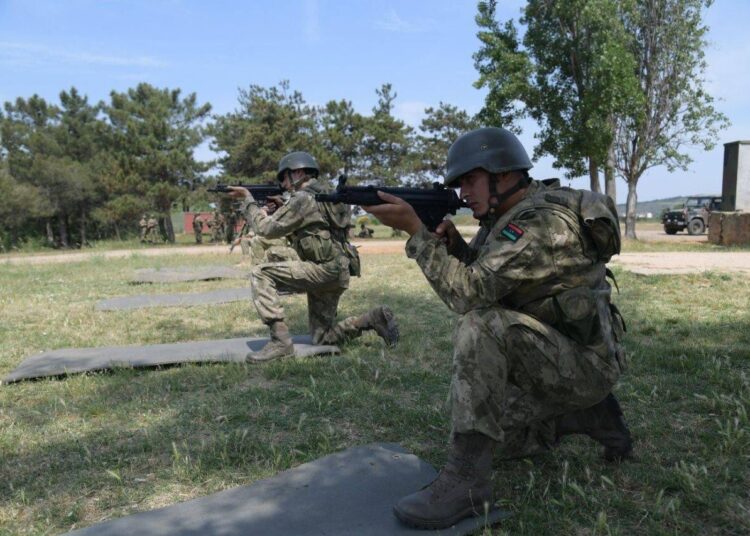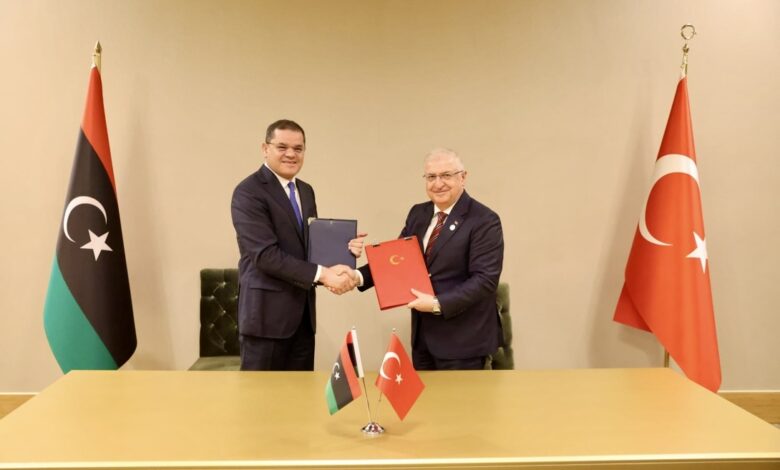August 16, 2024
A A

Libyan troops were observed undergoing training conducted by the Turkish army in Istanbul in August 2022.
Levent Kenez/Stockholm
Turkish President Recep Tayyip Erdogan on August 12 submitted a memorandum of understanding (MoU) to parliament regarding the status of Turkish forces currently stationed in Libya. The agreement, which underscores the deepening military cooperation between the two countries, grants Turkish forces broad legal protections and logistical support while operating on Libyan soil.
The memorandum, signed on March 1 in Antalya, builds upon previous understandings, including the Military Training Cooperation Memorandum signed in 2012 and the Security and Military Cooperation Memorandum signed in 2019. Turkey will support the restructuring and training of Libya’s armed forces and security forces. This initiative responds directly to Libya’s request for assistance, aiming to enhance the country’s defense capabilities.
One of the most noteworthy aspects of the MoU is the broad legal immunity it provides to Turkish forces operating in Libya. According to Article 11, any crimes committed by Turkish military personnel during their official duties or within the scope of their responsibilities will be governed exclusively by Turkish law. This means that Turkish personnel are effectively shielded from the Libyan legal system in matters related to their official duties, reinforcing Turkey’s jurisdictional authority over its forces abroad. However, crimes committed outside of official duties will fall under Libyan jurisdiction, with special provisions ensuring that any sentences align with the legal frameworks of both nations.
nations.
Page 1 / 8Zoom 100%
The agreement also grants Turkish forces significant operational freedoms in Libya. Article 12 allows Turkish personnel to carry personal and duty weapons and wear their official uniforms while on duty, reflecting a high level of autonomy in their operations. Moreover, Article 7 provides Turkish forces with unrestricted access to Libya’s airspace and territorial waters, exempting them from seizure or any local charges, further highlighting the operational latitude given to Turkish forces.
The MoU also facilitates logistical and operational efficiency by allowing Turkish forces to establish and manage their communication systems, as detailed in Article 9. This article permits the installation of both wired and wireless communication systems, ensuring seamless coordination between Turkish units and with command centers in Turkey. Additionally, Turkish forces are authorized to set up post offices, bank branches and recreational facilities within their assigned areas, as outlined in Article 16.
The Libyan government has committed to providing extensive logistical support to Turkish forces, a key feature of the MoU. Article 9 obligates Libya to cover the costs of essential services such as electricity, water, sewage and internet in the facilities used by Turkish forces, all free of charge. Moreover, Article 7 specifies that fuel and other logistical requirements for Turkish vehicles, whether on land, sea or air, will be provided without cost to Turkey.
In addition to logistical support, the MoU offers significant financial exemptions to Turkish forces. Article 14 exempts all imports and exports related to the Turkish military’s activities from any Libyan taxes, fees or duties. This provision ensures that Turkey can supply its forces without the financial burdens typically associated with international deployments. Furthermore, Article 8 states that the costs of contracts and purchases made by Turkish forces in Libya, either locally or from abroad, will be covered by the Libyan government, following consultations with Libyan authorities.
The MoU is set to remain in effect for three years, with the possibility of automatic one-year renewals unless one party notifies the other of its intent to terminate the agreement
.

The MOU was signed by Libyan Prime Minister Abdul Hamid al-Dbeibeh and Turkish Defense Minister Yaşar Güler in Antalya on March 1, 2024.
Turkey’s close ties to the Libyan government are accompanied by a growing military presence in the country over the years. At the end of 2023 a presidential motion proposing a 24-month extension of the Turkish military’s mission in Libya was approved by the Turkish parliament.
Underlining the importance of the Turkish navy’s presence in the region, President Erdogan stated that the government’s objective is to ensure national security against potential threats, including mass migration and terrorism, through the approved motion.
With financial backing from Qatar, Turkey has actively engaged in arming, training and supporting factions aligned with the Erdogan government in Libya since 2011.
Turkey has gone so far as to dispatch Syrian fighters to Libya as mercenaries, providing them with monthly salaries and promising Turkish citizenship for both the fighters and their families. The vetting and selection process for these fighters was carried out by Turkish intelligence agency MIT, which has collaborated with jihadist groups in Syria since 2011 with the aim of overthrowing President Bashar al-Assad.
Playing a crucial role in the military success of the UN-backed Government of National Accord (GNA) against the rebel opposition led by Khalifa Haftar, Turkey supplied weapons, ammunition and drones and organized Syrian mercenaries and jihadists to combat Haftar. Additionally, on January 2, 2020, Turkey’s parliament authorized the government to deploy military forces to Libya following a security cooperation deal.
Haftar’s attempt to seize Tripoli was abruptly halted after Turkey intervened with the supply of multi-purpose Bayraktar TB2 drones, manufactured by the Turkish company Baykar Makina, led by Erdogan’s son-in-law, Selçuk Bayraktar.
Beyond ideological support, Erdogan openly acknowledged the strategic importance of Libya’s oil and gas resources to Turkey. During a joint news conference with former Libyan prime minister Fayez al-Sarraj in Ankara on June 4, 2020, Erdogan unveiled plans to expand cooperation, including exploration and drilling operations, to harness natural resources in Libyan territory.
In November 2020 Turkey and the GNA signed a military cooperation pact and a maritime demarcation deal. While the maritime agreement, not recognized by any other Mediterranean country, delineates the Turkey-Libya continental shelf and exclusive economic zone (EEZ), the security deal enables the Turkish government to deploy its troops in Libya.
A report submitted to the UN Security Council on May 24, 2022 detailed UN investigators’ findings, indicating that the Turkish government persisted in violating UN sanctions by sending materiel and providing training to various factions in Libya.
The UN assessment concluded that a significant portion of the military training offered by Turkey fell within the sanctions regime, thereby contravening UN Resolution 1970 (2011). The report clarified that the only potential exemption applied to certain types of training, such as ordnance disposal, which might be categorized as humanitarian training. However, the UN Security Council explicitly prohibited combat, special forces and sniper training.
Turkey’s close ties to the Libyan government are accompanied by a growing military presence in the country over the years. At the end of 2023 a presidential motion proposing a 24-month extension of the Turkish military’s mission in Libya was approved by the Turkish parliament.
Underlining the importance of the Turkish navy’s presence in the region, President Erdogan stated that the government’s objective is to ensure national security against potential threats, including mass migration and terrorism, through the approved motion.
With financial backing from Qatar, Turkey has actively engaged in arming, training and supporting factions aligned with the Erdogan government in Libya since 2011.
Turkey has gone so far as to dispatch Syrian fighters to Libya as mercenaries, providing them with monthly salaries and promising Turkish citizenship for both the fighters and their families. The vetting and selection process for these fighters was carried out by Turkish intelligence agency MIT, which has collaborated with jihadist groups in Syria since 2011 with the aim of overthrowing President Bashar al-Assad.
Playing a crucial role in the military success of the UN-backed Government of National Accord (GNA) against the rebel opposition led by Khalifa Haftar, Turkey supplied weapons, ammunition and drones and organized Syrian mercenaries and jihadists to combat Haftar. Additionally, on January 2, 2020, Turkey’s parliament authorized the government to deploy military forces to Libya following a security cooperation deal.
Haftar’s attempt to seize Tripoli was abruptly halted after Turkey intervened with the supply of multi-purpose Bayraktar TB2 drones, manufactured by the Turkish company Baykar Makina, led by Erdogan’s son-in-law, Selçuk Bayraktar.
Beyond ideological support, Erdogan openly acknowledged the strategic importance of Libya’s oil and gas resources to Turkey. During a joint news conference with former Libyan prime minister Fayez al-Sarraj in Ankara on June 4, 2020, Erdogan unveiled plans to expand cooperation, including exploration and drilling operations, to harness natural resources in Libyan territory.
In November 2020 Turkey and the GNA signed a military cooperation pact and a maritime demarcation deal. While the maritime agreement, not recognized by any other Mediterranean country, delineates the Turkey-Libya continental shelf and exclusive economic zone (EEZ), the security deal enables the Turkish government to deploy its troops in Libya.
A report submitted to the UN Security Council on May 24, 2022 detailed UN investigators’ findings, indicating that the Turkish government persisted in violating UN sanctions by sending materiel and providing training to various factions in Libya.
The UN assessment concluded that a significant portion of the military training offered by Turkey fell within the sanctions regime, thereby contravening UN Resolution 1970 (2011). The report clarified that the only potential exemption applied to certain types of training, such as ordnance disposal, which might be categorized as humanitarian training. However, the UN Security Council explicitly prohibited combat, special forces and sniper training.
No comments:
Post a Comment